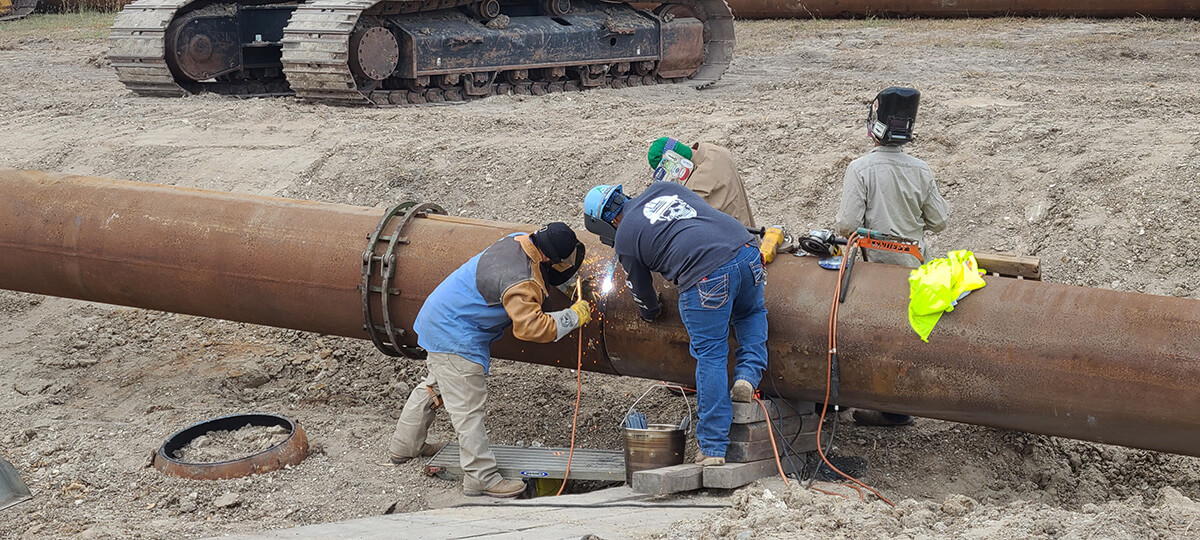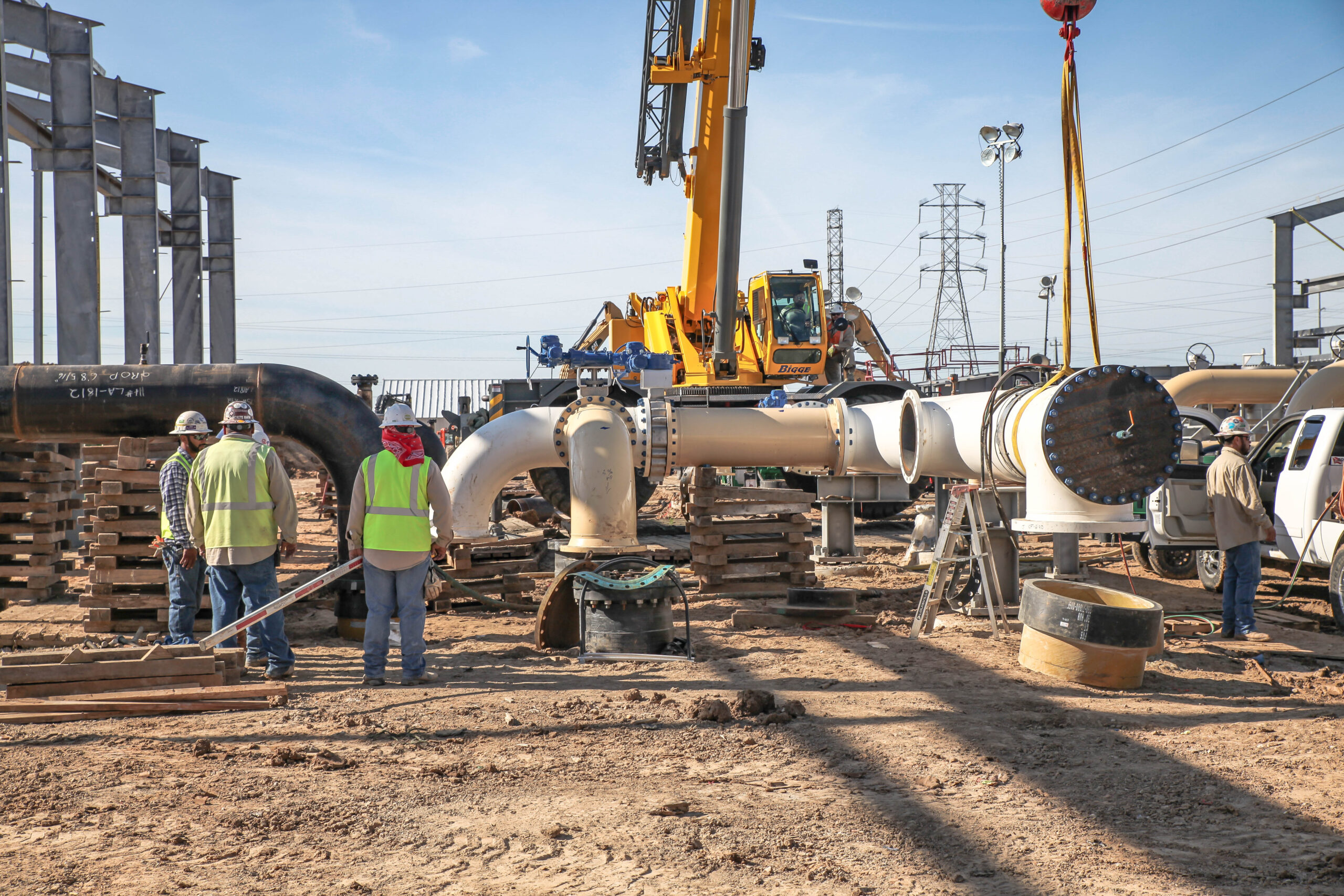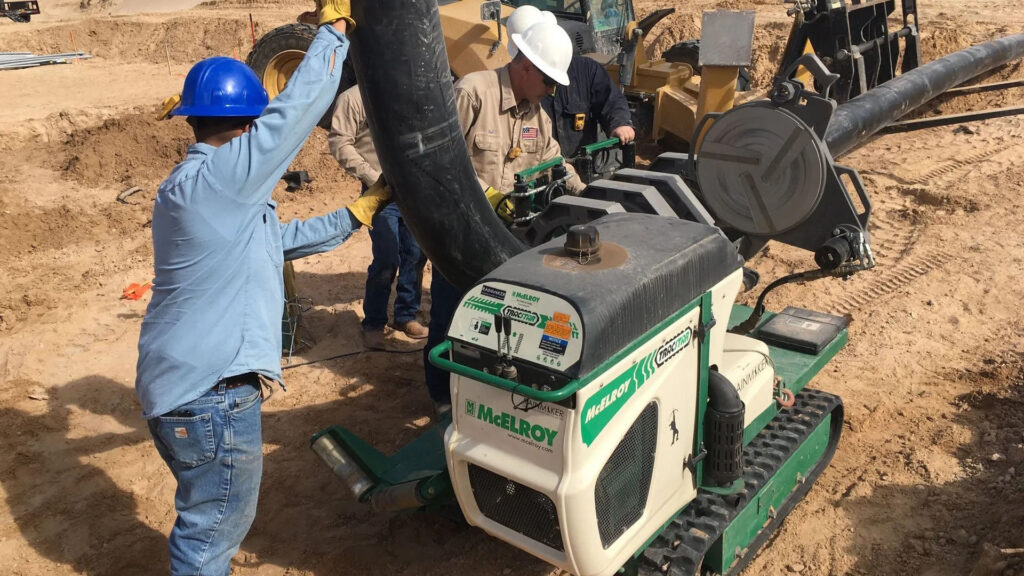The Ultimate Guide to Pipeline Construction Services for Developers
Wiki Article
The Necessary Overview to Recognizing Pipeline Construction Providers and Their Relevance
Pipeline Construction solutions are essential to the transportation of crucial resources such as oil, gas, and water. These services involve meticulous preparation and execution, adhering to strict safety and security and ecological requirements. As the market adapts to contemporary difficulties, recognizing its implications and elements ends up being progressively vital. What aspects add to the expanding importance of these services in today's economic climate? The complying with sections will certainly discover these crucial elements.Review of Pipeline Construction Services
Pipeline Construction services include a series of tasks essential for the installment and maintenance of pipes used to move numerous substances, consisting of water, oil, and gas. These solutions are vital for ensuring the effective and secure activity of sources from one place to another. The process generally begins with complete planning and layout, which thinks about governing demands, environmental considerations, and logistical difficulties.As soon as planning is total, excavation and grading of the land are conducted to prepare the site for Pipeline installment. This is followed by the actual laying of the pipelines, which involves welding or joining areas with each other to create a constant circulation course. After setup, strenuous testing is performed to assure integrity and safety and security. Maintenance services are also offered to deal with any problems that might emerge over time. On the whole, Pipeline Construction services play an essential role in sustaining facilities for energy and water distribution.
Trick Parts of Pipeline Construction
An effective Pipeline Construction task counts on several crucial parts that assure the reliable and secure setup of the Pipeline system. Complete website evaluations are important, as they determine the geographical and environmental factors that might influence Construction. Next off, the option of appropriate materials, such as pipelines and installations, is vital for safeguarding toughness and compatibility with the moved compounds.Advanced Construction strategies, consisting of trenchless technology and directional boring, enhance performance and lessen environmental influence. Reliable job management is an additional essential element, working with labor, tools, and timelines to meet project objectives.
Furthermore, interaction among stakeholders, consisting of designers, professionals, and local authorities, warranties positioning on job specs and requirements. Comprehensive top quality control measures throughout the Construction procedure guarantee compliance with market criteria and maximize the Pipeline's functional life expectancy. Jointly, these components form the backbone of a successful Pipeline Construction task.
Security Specifications and Regulations in Pipeline Construction

Improving Regulative bodies, such as the Occupational Security and Wellness Administration (OSHA) and the Pipeline and Hazardous Materials Safety And Security Management (PHMSA), stated specific demands that control Construction practices. These consist of procedures for devices use, employee training, and emergency situation response procedures. By implementing these requirements, Construction firms not just secure their workers but likewise secure public count on. Ultimately, rigorous precaution add to the long-term success of Pipeline tasks, guaranteeing they satisfy both operational and environmental expectations.
Ecological Factors To Consider in Pipeline Projects

Ecological factors to consider are integral to the planning and implementation of Pipeline tasks. These projects should assess possible influence on environments, water sources, and neighborhood wildlife. Carrying out thorough environmental effect evaluations (EIAs) is crucial, permitting stakeholders to recognize and reduce threats prior to Construction starts.
Protecting delicate areas, such as marshes and habitats, often calls for executing specific layout attributes or alternative transmitting to minimize disturbance. Additionally, Pipeline drivers are tasked with establishing approaches for preventing leaks and spills, which can have disastrous effects on the atmosphere.
Engagement with regional areas is vital, as public problems can lead to job modifications that improve ecological defense. Compliance with policies established by environmental companies assures that tasks meet sustainability requirements, promoting an equilibrium in between framework requirements and environmental conservation. Inevitably, addressing ecological considerations not only safeguards nature but likewise advertises area trust fund and task practicality.
The Function of Modern Technology in Pipeline Construction
Modern technology plays a vital role in modern Pipeline Construction, enhancing effectiveness and accuracy. Advanced checking techniques enable accurate planning and execution, reducing environmental impact and job delays. Additionally, the integration of automation and robotics streamlines procedures, lowering labor prices and enhancing safety and security on Construction websites.Advanced Evaluating Methods
Advanced evaluating techniques play a necessary function in the successful execution of Pipeline Construction tasks. These approaches utilize advanced technology to guarantee specific mapping and evaluation of the terrain where pipes will be installed. Strategies such as Geographic Info Solution (GIS), LiDAR (Light Detection and Ranging), and 3D modeling make it possible for designers to envision and examine the landscape, identifying ecological concerns and possible barriers. By using these sophisticated tools, groups can enhance precision ready and alignment, greatly minimizing the risk of mistakes throughout Construction. Additionally, real-time information collection enables prompt changes and educated decision-making throughout the job lifecycle. Ultimately, these surveying advancements add to boosted efficiency, safety, and sustainability in Pipeline Construction efforts.Automation and Robotics

Economic Impact of Pipeline Framework
Pipeline framework plays a crucial duty in shaping local economic situations and helping with profession. By providing a reputable methods of carrying oil, gas, and various other assets, pipelines lower transportation prices and improve supply chain efficiency. This framework brings in financial investment, stimulates work production, and fosters financial growth in bordering areas.Moreover, the Construction and upkeep of pipelines contribute considerably to neighborhood economic situations, producing countless job opportunity in numerous sectors, from engineering to labor. The influx of work frequently results in boosted investing in regional organizations, even more strengthening financial activity.
In addition, pipes boost energy safety by guaranteeing a secure supply of sources, which is essential for household needs and commercial procedures. As areas end up being adjoined via Pipeline networks, they get to broader markets, boosting competitiveness and economic strength. The economic influence of Pipeline facilities is multifaceted, influencing both immediate neighborhood economic situations and wider local growth.
Future Fads in Pipeline Construction Services
The future of Pipeline Construction services is progressing in action to technical developments, governing changes, and expanding ecological considerations. Developments such as drones and robotics are improving examination and upkeep processes, enhancing safety and efficiency. Automation visit our website is positioned to minimize labor prices and increase accuracy in Construction procedures. In addition, the enhancing emphasis on sustainability is triggering firms to adopt environment-friendly products and methods, aligning with global efforts to lower carbon impacts.Governing frameworks are additionally adapting to resolve ecological impacts, pushing for greater transparency and responsibility in Pipeline projects. Moreover, the combination of wise innovations, consisting of real-time monitoring browse this site systems, is anticipated to improve the reliability and efficiency of Pipeline networks. As power demands change toward eco-friendly resources, Pipeline Construction services will likely see a surge in tasks connected to biofuels and hydrogen transport. Overall, these fads indicate a transformative duration for the Pipeline Construction industry, concentrated on innovation and sustainability.
Frequently Asked Questions
What Kinds of Pipelines Are Typically Built?
Different kinds of pipelines are frequently built, consisting of oil, gas, water, and sewage pipelines - Pipeline Construction Services. Each offers distinct purposes, facilitating the transportation of necessary resources throughout areas while sticking to safety and security and ecological regulationsHow much time Does a Typical Pipeline Task Take?
The period of a typical Pipeline job differs significantly, often varying from a number of months to a few years. Variables influencing this timeline include job intricacy, governing authorizations, and environmental considerations that should be attended to.That Controls Pipeline Construction Firms?
Pipeline Construction companies are managed by numerous federal, state, and regional firms, consisting of the Pipeline and Hazardous Products Security Management (PHMSA) and state utility commissions, making certain conformity with safety and security and environmental requirements throughout the Construction process.What Are Typical Products Utilized in Pipeline Construction?
Typical materials utilized in Pipeline Construction consist of pvc, steel, and polyethylene. Each material supplies distinctive advantages such as durability, resistance, and flexibility to rust, making them ideal for various applications in transporting gases and liquids.
How Are Pipeline Construction Prices Approximated?
Pipeline Construction costs are estimated by assessing aspects such as material expenses, labor rates, job intricacy, environmental considerations, and regulative needs (Pipeline Construction Services). Precise cost estimate guarantees efficient budgeting and project planning throughout the Construction procedurePipeline Construction services include an array of activities vital for the installment and maintenance of pipes used to transfer various compounds, including gas, oil, and water. An effective Pipeline Construction task counts on several essential components that guarantee the reliable and safe installment of the Pipeline system. Advanced surveying methods play a vital duty in the successful execution of Pipeline go to website Construction tasks. Different types of pipelines are frequently built, including oil, water, gas, and sewer pipes. Pipeline Construction costs are estimated by analyzing aspects such as material costs, labor prices, task complexity, ecological considerations, and governing needs.
Report this wiki page